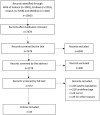A systematic review of data sources for artificial intelligence applications in pediatric brain tumors in Europe: implications for bias and generalizability
- PMID: 38016063
- PMCID: PMC10646175
- DOI: 10.3389/fonc.2023.1285775
A systematic review of data sources for artificial intelligence applications in pediatric brain tumors in Europe: implications for bias and generalizability
Abstract
Introduction: Europe works to improve cancer management through the use of artificialintelligence (AI), and there is a need to accelerate the development of AI applications for childhood cancer. However, the current strategies used for algorithm development in childhood cancer may have bias and limited generalizability. This study reviewed existing publications on AI tools for pediatric brain tumors, Europe's most common type of childhood solid tumor, to examine the data sources for developing AI tools.
Methods: We performed a bibliometric analysis of the publications on AI tools for pediatric brain tumors, and we examined the type of data used, data sources, and geographic location of cohorts to evaluate the generalizability of the algorithms.
Results: We screened 10503 publications, and we selected 45. A total of 34/45 publications developing AI tools focused on glial tumors, while 35/45 used MRI as a source of information to predict the classification and prognosis. The median number of patients for algorithm development was 89 for single-center studies and 120 for multicenter studies. A total of 17/45 publications used pediatric datasets from the UK.
Discussion: Since the development of AI tools for pediatric brain tumors is still in its infancy, there is a need to support data exchange and collaboration between centers to increase the number of patients used for algorithm training and improve their generalizability. To this end, there is a need for increased data exchange and collaboration between centers and to explore the applicability of decentralized privacy-preserving technologies consistent with the General Data Protection Regulation (GDPR). This is particularly important in light of using the European Health Data Space and international collaborations.
Keywords: CNS tumors; artificial intelligence; childhood cancer; data sharing; pediatric oncology.
Copyright © 2023 Tozzi, Croci, Voicu, Dotta, Colafati, Carai, Fabozzi, Lacanna, Premuselli and Mastronuzzi.
Conflict of interest statement
The authors declare that the research was conducted in the absence of any commercial or financial relationships that could be construed as a potential conflict of interest.
Figures
References
-
- Bhinder B, Gilvary C, Madhukar NS, Elemento O. Artificial intelligence in cancer research and precision medicine. Cancer Discovery (2021) 11:900–15. doi: 10.1158/2159-8290.CD-21-0090 - DOI - PMC - PubMed
Publication types
LinkOut - more resources
Full Text Sources



